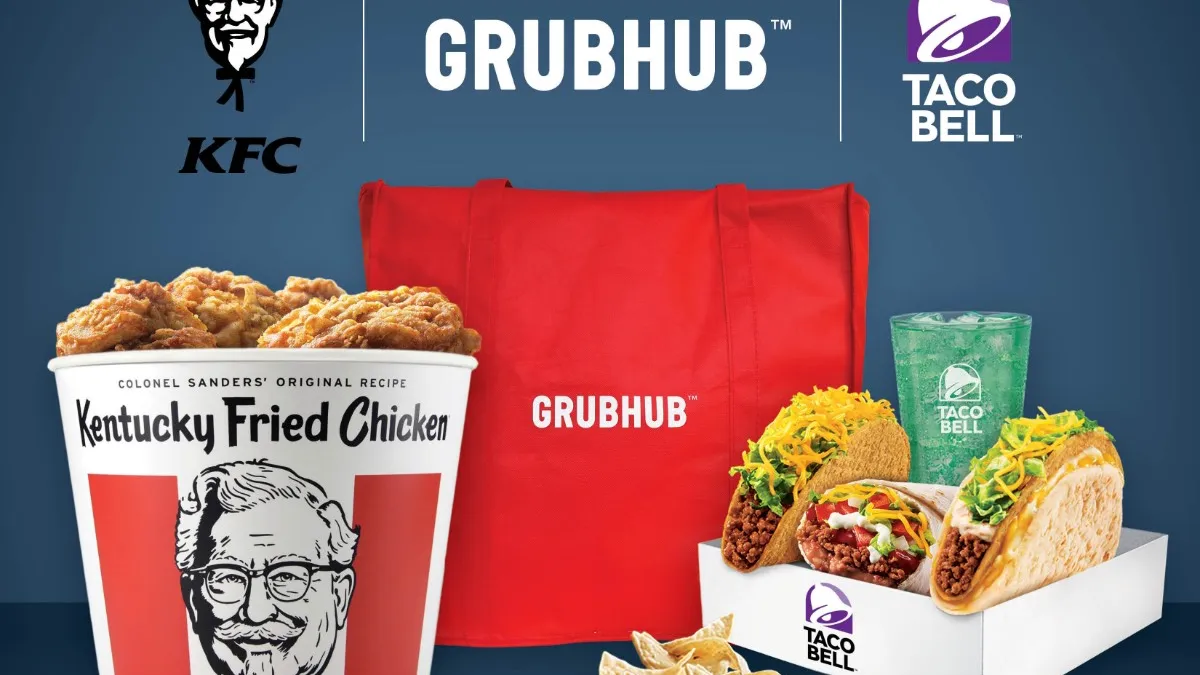Dive Brief:
- Yum Brands, parent company of KFC, Pizza Hut and Taco Bell, is suing Grubhub, stating that the foodservice delivery platform violated the agreement the two companies struck in 2018, CNBC reports. This lawsuit comes one day after European-based Just Eat Takeaway acquired Grubhub in an all-stock deal.
- The lawsuit alleges Grubhub CEO Matt Maloney "improperly terminated" its contract with Yum in early June, claiming the restaurant giant’s partnerships with Uber Eats and Postmates violated terms of that 2018 deal, which Yum denies.
- According to the suit, the contract between the two companies includes a $50 million termination fee for Yum if Grubhub was taken over by a competitive third party, adding that the Just Eat acquisition “may be relevant” in this case.
Dive Insight:
A little more than two years after Yum bought a 3% stake in Grubhub, the relationship between the two have come to a head.
The relationship seemed steady a year in, with Yum’s Pizza Hut piloting delivery through Grubhub in February 2019, one of the few major pizza brands to add third-party delivery. Yum’s brands also leveraged Grubhub through the beginning of the pandemic, offering free delivery for families sheltered in place.
Yum alleges in the new suit, however, that Grubhub now regrets its master services agreement with the company. "This regret has been expressed verbally and has been demonstrated in Grubhub’s actions," the company said as reported by Restaurant Business.
According to the lawsuit, those actions include adding a new pricing structure, which Grubhub emailed Yum’s franchisees directly on Monday, with fees that could have consumers paying 40% more for KFC, Taco Bell and Pizza Hut deliveries. In an environment in which high commission fees dominate the narrative, this could be a huge hit for an operator.
Additional allegations are just as messy. Yum claims Grubhub blacked out its open restaurants during the pandemic, when delivery became a critical channel for survival. If that allegation proves true, it could be a compelling argument for why Yum partnered with other third-party services. However, the shift away from exclusive deals, while accelerating during the pandemic, has been ongoing since last year as a way for brands to gain greater exposure across marketplaces. It’s unclear when Yum’s brands added Uber Eats or Postmates to the mix, but a 2019 year-in-review Postmates blog references KFC.
The lawsuit also claims that Grubhub insisted on payments for services listed as free in the contract, and that it required additional fees from Taco Bell and KFC for its new subscription service launched in February.
Yum reportedly asked Grubhub to renegotiate the contract, however Grubhub’s direct communication with its franchisees seems to indicate that negotiations aren’t on the table.
In a statement to CNBC, Grubhub denies the allegations listed in the lawsuit, stating, "It is unfortunate that Yum! has taken this step and we are very sorry about the situation Yum Franchisees are in with millions of dollars now at risk especially in the midst of this challenging environment. We’re happy to work with Yum to resolve our contract dispute, but we intend to ensure that Grubhub and its stakeholders are protected against Yum's breach of the exclusivity provisions of the agreement."
While the lawsuit lays out the potential strains of their relationship, there have been earlier signs of trouble. In October 2019, for example, Yum’s tie-up with Grubhub eroded investor confidence in the company as the delivery app struggled against increased competition. Grubhub used to be the king of third-party delivery, but its market share leadership position eroded by aggressive growth from both DoorDash and Uber Eats. The company has since started adding non-partner restaurants to try and boost market share and potentially convert more independents to platform partners. While enterprise QSR partnerships help drive users to the site because of known brands, these partnerships don't necessarily make Grubhub as much money as small and medium restaurants, which tend to purchase more services beyond just delivery, executives said in 2019.













